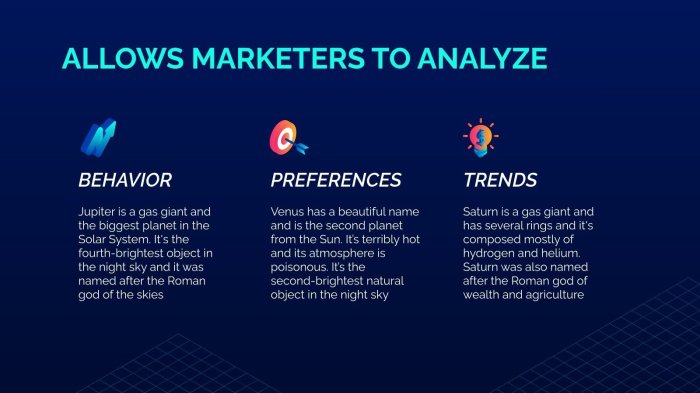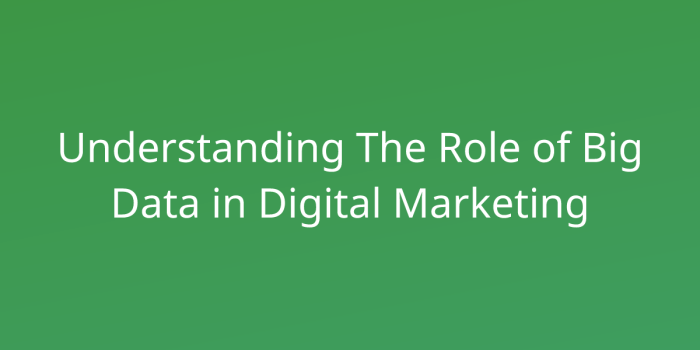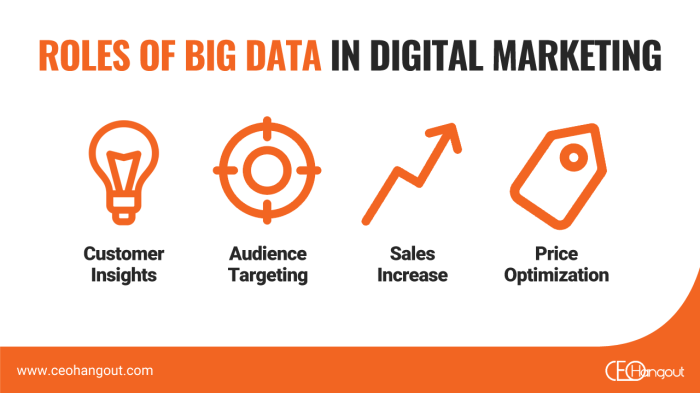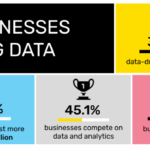Big data and its role in digital marketing are revolutionizing how brands connect with their audiences. In a world where consumer interactions generate vast amounts of data, marketers harness this information to craft tailored strategies that resonate with individual preferences. This not only enhances the customer experience but also drives business growth through precision-targeted campaigns.
As companies increasingly rely on data-driven insights, the importance of understanding consumer behavior becomes paramount. By analyzing patterns and trends, businesses can not only anticipate market shifts but also innovate their approaches, ensuring they stay ahead in the competitive landscape. Examples abound, with leading firms leveraging big data to refine their marketing tactics and achieve exceptional results.
The Importance of Big Data in Digital Marketing

Big data has transformed the landscape of digital marketing, allowing businesses to tailor their strategies based on extensive consumer insights and data analytics. The ability to analyze vast amounts of data enables marketers to understand consumer behavior, optimize their marketing efforts, and ultimately drive better results. This technological advancement not only enhances targeting capabilities but also fosters personalized experiences that resonate with audiences.The influence of big data on marketing strategies is profound, as it equips companies with actionable insights that inform decision-making processes.
By leveraging data analytics, businesses can segment their audience more effectively, predict trends, and measure campaign performance with unprecedented accuracy. For example, a company like Netflix utilizes big data to analyze viewing patterns and preferences, enabling it to recommend personalized content to its users. This strategy not only enhances user engagement but also reduces churn rates significantly.
Successful Companies Leveraging Big Data for Marketing
Numerous companies have successfully integrated big data into their marketing strategies, yielding impressive results. The following are notable examples that illustrate this trend:
- Amazon: By employing big data analytics, Amazon personalizes the shopping experience for millions of customers. Their recommendation engine analyzes customer purchases, browsing history, and product reviews to suggest items that align with individual preferences, leading to increased sales and customer loyalty.
- Starbucks: Starbucks leverages customer data collected from its loyalty program and mobile app to understand consumer preferences. This data informs their product offerings and promotional strategies, allowing them to enhance customer engagement and drive foot traffic to their stores.
- Coca-Cola: Coca-Cola uses big data analytics to monitor consumer sentiment and market trends. By analyzing social media conversations and feedback, they can adjust their marketing strategies in real-time, ensuring their campaigns resonate with consumers and remain relevant.
The impact of big data on consumer behavior and preferences is evident as marketers gain deeper insights into what drives customer decisions. Understanding the nuances of consumer behavior enables businesses to create targeted campaigns that appeal directly to their audiences. Marketers can now observe buying patterns, preferences, and feedback in real-time, allowing for swift adaptations to campaigns and product offerings.
Designing an effective relational database schema is key to ensuring data integrity and efficient retrieval. To achieve this, one should follow best practices outlined in how to effectively design a relational database schema. This includes normalizing data, defining clear relationships, and ensuring scalability for future growth, all of which contribute to a robust database structure.
“Data-driven marketing allows companies to understand their customers on a deeper level, enabling tailored experiences that increase satisfaction and retention.”
As companies continue to harness the power of big data, the ability to meet consumer expectations will only improve. By aligning their marketing strategies with data insights, businesses can foster stronger relationships with their customers, ultimately leading to sustained growth and success in a competitive digital landscape.
Tools and Technologies for Big Data in Marketing
The integration of big data into digital marketing strategies has ushered in a new era of data-driven decision-making. With vast amounts of data being generated every minute, marketers are leveraging sophisticated tools and technologies to glean actionable insights and enhance their campaigns. Understanding the right tools is essential for effectively analyzing and utilizing big data in marketing efforts.
Popular Tools for Big Data Analysis in Digital Marketing
Numerous tools are available that cater to the unique needs of marketers aiming to harness big data. These tools enable seamless data collection, processing, and analysis, ultimately leading to informed marketing strategies. The following is a list of popular tools that are widely used in the industry:
- Google Analytics: A foundational tool for tracking website traffic and user behavior, providing insights into customer engagement.
- Apache Hadoop: An open-source framework that allows for the distributed storage and processing of large datasets across clusters of computers.
- Tableau: A powerful data visualization tool that helps marketers create interactive and shareable dashboards, making data insights easily interpretable.
- IBM Watson: Utilizes AI and machine learning to analyze unstructured data, allowing for more nuanced insights into consumer behavior.
- Salesforce: A customer relationship management tool that integrates big data analytics for personalized marketing strategies.
- Microsoft Power BI: A business analytics tool that provides interactive visualizations and business intelligence capabilities with an interface simple enough for end users to create their own reports and dashboards.
Role of Machine Learning in Processing Big Data
Machine learning plays a pivotal role in analyzing big data by enabling algorithms to learn from vast datasets and improve over time without explicit programming. This technology enhances marketing strategies by identifying patterns and trends that might not be visible through traditional data analysis methods. Machine learning algorithms can process customer behavior data, predict future trends, and personalize marketing messages effectively.The implementation of machine learning in marketing can lead to improved customer segmentation and targeting.
For instance, algorithms can analyze past purchasing behaviors to recommend products tailored to individual preferences. This not only enhances customer experience but also drives conversion rates. Additionally, machine learning facilitates real-time data analysis, allowing marketers to adapt their strategies quickly based on immediate feedback.
Comparison of Traditional Marketing Tools vs. Big Data Tools
The shift from traditional marketing tools to big data tools marks a significant evolution in how marketing campaigns are executed and analyzed. Traditional tools often rely on historical data and general market trends, while big data tools utilize real-time analytics and comprehensive datasets for more accurate insights.The following table illustrates key differences between these two approaches:
| Aspect | Traditional Marketing Tools | Big Data Tools |
|---|---|---|
| Data Sources | Limited to historical data and surveys | Integrates multiple real-time data sources |
| Analysis Speed | Slower, often manual analysis | Real-time, automated analysis |
| Customer Insights | Generalized insights based on average demographics | Detailed, personalized insights based on individual behavior |
| Adaptability | Less adaptable to changing market conditions | Highly adaptable with immediate adjustments |
In summary, the advent of big data technologies has transformed the landscape of digital marketing. The tools and methodologies now available empower marketers to make data-driven decisions, leading to more effective strategies and enhanced customer engagement.
Data Collection Methods for Effective Marketing
In the era of digital marketing, the ability to collect and analyze big data is crucial for businesses aiming to enhance their marketing strategies. Various data collection methods enable companies to gather insights about consumer behavior, preferences, and trends. This information empowers marketers to tailor their campaigns effectively, ensuring that they engage their target audience in meaningful ways.The importance of user consent and data privacy cannot be overstated in the context of data collection.
As consumers become more aware of their digital footprints, businesses must prioritize ethical practices to maintain trust and comply with regulations. Transparent communication about data usage and obtaining explicit consent from users is essential for fostering a positive relationship with customers.
Methods of Collecting Big Data in Marketing
Several effective methods are employed in the collection of big data for marketing purposes. Each method offers unique advantages depending on the marketing objectives:
1. Surveys and Questionnaires
These tools allow marketers to directly gather feedback from consumers, providing insights into customer satisfaction and preferences. They can be distributed online, maximizing reach and response rates.
2. Web Analytics
Platforms like Google Analytics track user behavior on websites, offering valuable data on how visitors interact with content. This helps marketers understand which pages perform well and where improvements are needed.
When managing databases, understanding the most common database performance bottlenecks is crucial. Issues such as inefficient queries, inadequate indexing, and resource contention can significantly hinder performance. By identifying these bottlenecks early on, you can implement strategies to optimize your database and enhance overall efficiency.
3. Social Media Monitoring
Analyzing data from social media platforms offers real-time insights into customer sentiment and engagement. Tools like Hootsuite and Sprout Social help in tracking mentions, hashtags, and user interactions.
4. Customer Relationship Management (CRM) Systems
CRM systems, such as Salesforce, collect and analyze customer interactions, helping businesses tailor their marketing strategies based on historical data and buying patterns.
5. Cookies and Tracking Technologies
These methods allow marketers to collect data on user behavior across websites. While effective, they require careful management to respect user privacy.
6. Mobile App Analytics
As mobile usage continues to rise, collecting data through app interactions enables marketers to understand user engagement and preferences on mobile platforms.
7. IoT Devices
The Internet of Things offers a wealth of data from connected devices that can be leveraged for targeted marketing and personalized experiences.
“Data-driven marketing is not just about collecting data; it’s about making sense of it to create meaningful customer experiences.”
Best Practices for Ethical Data Collection
Implementing ethical data collection practices is vital for maintaining consumer trust and fulfilling legal obligations. The following best practices can help ensure responsible data collection:To safeguard user interests while optimizing data collection processes, businesses should adhere to these guidelines:
- Obtain informed consent from users before collecting any data.
- Clearly communicate the purpose of data collection and how the data will be used.
- Implement robust data security measures to protect user information.
- Offer users the option to opt-out of data collection efforts at any time.
- Regularly review and update privacy policies to reflect current practices and regulations.
- Limit data collection to only what is necessary for the intended purpose.
- Ensure compliance with GDPR and other relevant data protection laws.
Case Studies of Big Data Impact on Digital Marketing: Big Data And Its Role In Digital Marketing

The integration of big data into digital marketing strategies has yielded transformative results for many companies. By leveraging vast amounts of data, marketers can create personalized experiences that resonate with consumers, ultimately enhancing engagement and driving sales. This section highlights notable case studies that exemplify the profound impact of big data on marketing campaigns.
Notable Case Studies
Several companies have successfully harnessed big data to improve their marketing efforts. These case studies showcase how data insights led to significant enhancements in key performance metrics.
1. Netflix
By analyzing viewing habits and preferences, Netflix successfully developed its recommendation engine, which accounts for over 80% of the content watched on the platform. The result? A 75% increase in customer retention rates, showcasing the power of personalized content delivery based on viewer data.
2. Coca-Cola
Through extensive data analysis, Coca-Cola revamped its marketing strategy to focus on regional tastes and preferences. Implementing a data-driven approach allowed them to tailor campaigns based on local insights, resulting in a 30% increase in customer engagement and a notable uptick in sales during targeted promotions.
3. Amazon
Amazon’s use of big data for personalized product recommendations has revolutionized online shopping. By analyzing customer behavior and purchase history, Amazon saw a 29% increase in sales attributed directly to its recommendation system, illustrating the effectiveness of targeted marketing based on data insights.
Key Metrics Improved Through Big Data Utilization
The effectiveness of big data in digital marketing is evident in the various metrics that are significantly enhanced. Some of these include:
- Customer Retention Rates
- Conversion Rates
- Customer Engagement Levels
- Sales Growth
- Marketing ROI
The following table summarizes the before-and-after results from big data applications in selected case studies:
| Company | Metric | Before Big Data | After Big Data |
|---|---|---|---|
| Netflix | Customer Retention Rate | Not Available | 75% |
| Coca-Cola | Customer Engagement | 0% | 30% |
| Amazon | Sales Growth | Not Available | 29% |
These case studies illustrate the significant improvements that can be achieved through the strategic use of big data in digital marketing. The application of data analytics not only enhances marketing efforts but also strengthens customer relationships and drives business growth.
Future Trends of Big Data in Digital Marketing

The future of big data in digital marketing is poised for transformative changes. As technology evolves and consumer behaviors shift, marketers must adapt their strategies to harness the full potential of big data. This segment explores the key emerging trends that are likely to shape the landscape of digital marketing through the lens of big data, artificial intelligence, and consumer data management.
Emerging Trends in Big Data
Several trends are anticipated to influence how businesses leverage big data for marketing purposes. Understanding these trends is crucial for developing effective marketing strategies that resonate with evolving consumer expectations.
- Integration of Artificial Intelligence: AI technologies will take center stage, enabling marketers to analyze vast datasets more efficiently. Predictive analytics powered by AI will become standard, offering insights that facilitate proactive marketing decisions.
- Real-Time Data Utilization: The ability to access and analyze data in real-time will empower marketers to adjust campaigns on the fly, enhancing campaign effectiveness and customer satisfaction.
- Increased Focus on Personalization: With big data, marketers can create hyper-personalized experiences. Utilizing insights from customer behavior and preferences will lead to tailored messaging that resonates with individual consumers.
- Enhanced Privacy Measures: As data privacy regulations become stricter, businesses will need to prioritize transparency in their data collection and usage practices, fostering trust with consumers.
- IoT and Big Data Synergy: The Internet of Things (IoT) will generate massive amounts of data that can be leveraged for marketing purposes. Connecting devices will provide deeper insights into consumer behavior and preferences.
Impact of Artificial Intelligence on Data Usage, Big data and its role in digital marketing
Artificial intelligence is set to redefine how marketers approach and utilize big data. By automating complex data analysis processes, AI will streamline decision-making and enhance the precision of marketing strategies.The integration of AI into marketing will lead to the following advancements:
- Automated Insights: AI systems will analyze consumer data and provide actionable insights without the need for human intervention, increasing operational efficiency.
- Predictive Consumer Behavior: AI algorithms will predict future buying behaviors, allowing marketers to anticipate customer needs and tailor offerings accordingly.
- Sentiment Analysis: AI will help businesses gauge consumer sentiment through social media and online interactions, informing marketing strategies that align with public perception.
Evolution of Consumer Data Management
As the landscape of data privacy continues to evolve, effective consumer data management will become more critical than ever. Marketers will need to adapt their strategies to align with changing regulations and consumer expectations.Key predictions for consumer data management include:
- Data Governance Frameworks: Businesses will invest in robust data governance frameworks to ensure compliance with regulations such as GDPR and CCPA, safeguarding consumer rights.
- Enhanced Data Segmentation: Companies will implement advanced segmentation techniques, enabling more granular targeting based on specific consumer behaviors and demographics.
- Focus on Data Quality: Ensuring the accuracy and relevance of data collected will be prioritized, as high-quality data is essential for effective decision-making.
- Consumer-Centric Data Strategies: Marketers will shift towards strategies that prioritize consumer consent and transparency in data collection, creating a more trustworthy relationship.


